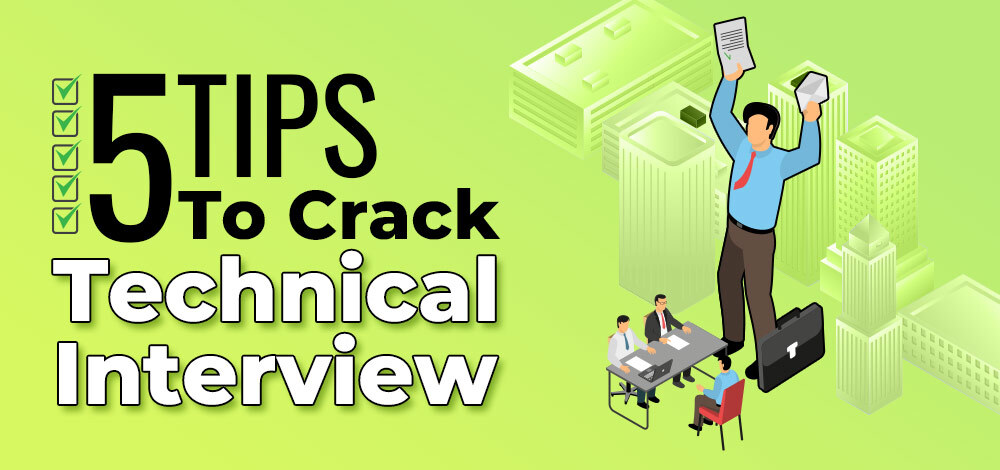Got an invite for your first coding interview? Yes? Then, you’re up for a very exhausting yet exciting technical interview process of your life. Firsts are always memorable – for good or worse. Like many others, you can look up the best tricks and tips to crack your first technical interview but only when you’re equipped with the right mindset, you’ll be able to pass the coding interview rounds with flying colors.

Before moving forward, let’s check what is a technical interview and what are its stages you need to walk through to pass the interview process.
What is a Technical Interview?
In contrast to other forms of interviews, technical interviews include challenges and coding assignments. They’re more akin to an exam than a standard question-and-answer session. You must exhibit that you have the talent necessary for the job, rather than simply telling the interviewer that you have them. Interviewers are more interested in your skills that can solve their problems.
The goal of the technical interview, contrary to common opinion, is not to bamboozle you with riddles, brain teasers, or difficult questions. Instead, it’s to examine how you handle real-world situations, such as those you could face if you get the job!
Now let’s look at the technical interview process you will face in your first technical interview with the top product-based companies.
Technical Interview Process in 3 Phases
Technical interviews are often the same in every other product-based company, unlike service-based companies. Breaking down the interview process into 3 phases:
1st Phase- The Technical Phone or Video Screen: Hallelujah! You finally got the call you were waiting for so long – your very first technical interview invitation. The company was impressed with your résumé and wants to speak with you further. This brief social and technical screening step is intended to determine whether you are qualified and eager enough to move on to the next technical level. This portion of the interview usually lasts 15-30 minutes.
2nd Phase- Remote Coding Interview/Round: Before having you come in, some organizations will want to assess your coding skills with a preliminary exam. It might be done over the phone, through Skype or Zoom, and might have a coding round (3-4 DSA-based questions) or as a remote homework project. A remote coding challenge should only take a few hours if the company respects your time.
3rd and Final Phase- Onsite Interview/Whiteboarding Challenge: This is what most people refer to as the “technical interview.” It consists of an in-person interview with coding problems that you must solve in front of the interviewer on a whiteboard(s). If the company is not in the same city you live in then this might also be done remotely by video conference. Whiteboard interviews are usually 1-2 hours long, while the entire onsite technical interview might span several hours to a full day.
Now that you’ve got an inkling of what goes on behind the scenes in a technical interview process, it’s time to read through some of the best tips and tricks to crack your first technical interview and get a job in a top product-based company.
5 Tips To Crack Your First Technical Interview
1. Do a thorough background check on the company you’re applying for. Once you’ve got an idea about the company’s background and what they are seeking, you’ll understand their interview pattern as well. You can also check the company-wise interview preparation pages to study what type of questions they’ll throw at you during the grilling session.
2. Some companies may require their candidates to complete coding challenges to demonstrate their talents. As a result, begin your preparations in coding and programming languages as soon as possible so that you are ready to tackle any problems posed by the company. Examine previous problems and interviews with previous employers to get a sense of the exam.
3. A solid grasp of technical tools and skills positions you to answer any inquiry, no matter how challenging. As a result, before attending the interview, make a brief summary of what you need to learn or review.
4. Employers do not only search for correct answers throughout the technical interview process. They also assess your ability to confidently answer the questions, as well as your attitude and comfort in handling the questions. As a result, instead of replying to the interviewer’s question instantly, think about it completely. If you can’t answer a question, be honest and transparent with your employer; it shows your honesty and confidence.
5. The more dedicated and prepared you are for your technical interview, the better your chances of passing. When replying to questions, carefully consider your replies and be exact. Take your time when completing any assignments or real-time coding challenges. In fact, while practicing your mock coding or technical challenges, establish a timer to guarantee you do your assignment within the time limit. The more time you spend reacting to or fixing a problem, the less likely you are to be considered for the job. You can access GeeksforGeeks’ Practice Portal to solve coding questions and see your efficiency before jumping into the real world.
6. When you’re all done with the tips to follow, How to get started for technical Interviews will help you to have a complete overview of the steps followed while preparing for technical interviews.
Conclusion
Technical interviews aren’t a tough nut to crack even for freshers, especially if you’re prepared enough. Ensure that you’re good at the basic languages and have practiced enough questions beforehand. Don’t be too nervous and you shall be fine. And if you want to be 100% job ready by an industry expert, then GeeksforGeeks has the exact course for you – Complete Interview Preparation – Self-Paced course that will make you fully ready for product-based companies without much hassle.

